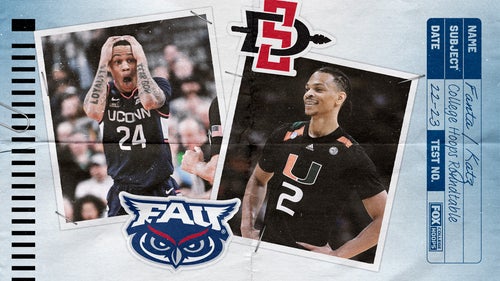
Northwestern has talent and toughness to finally end NCAA tournament drought
Every few moments, the door to the United Center’s visitors hockey dressing room swung open and a whomping, throbbing bass line intruded upon the hallway quiet. This was the sound of victory last Saturday night. Northwestern basketball had taken over that room for the Chicago Legends Classic and subsequently took a 67-64 win over Dayton in the first game of the doubleheader. The post-victory celebration—bulbous beats, some dancing and a water bottle shower for coach Chris Collins—was standard. The triumph itself—in which the Wildcats built a 24-point lead, then hung on to hang the kind of pelt that should look good to the NCAA tournament selection committee—was not. “You can hear the music back in there,” sophomore forward Vic Law said, leaning against wall, lingering about 20 feet from the rumpus. “Everyone just loves the whole process of winning and what it takes to get to winning.”
It was mid-December and it was fair to consider what that night would mean for Northwestern in March, and that was a win in itself. Pondering whether the Wildcats' roster is equipped to earn the program’s first-ever NCAA tournament bid—well, that’s a reflex every year at this point. But it’s also an exercise typically built upon too many conditionals, too many what-ifs, to seem real. The difference now: There should be no pondering. Northwestern is a self-assured, well-stocked and tough-minded bunch, adequately vetted by a schedule built for more than just victory-hoarding. The bar to clear is not set at championship height. All the Wildcats, now 9-2, have to do is make the field of 68. And they can.
The vital signs for such a run are there. In his fourth year on the job, Collins finally has a roster full of his guys: The core trio of the springy 6’7” Law, 6’5” wing Scottie Lindsey and 6’3” point guard Bryant McIntosh, the latter two of whom are juniors, all committed to play for the program within six months of Collins’ arrival in March 2013. They comprise the Wildcats’ top three scorers, but their offensive ratings rank only fifth, sixth and eighth, respectively, among rotation players; cogs like seniors Nathan Taphorn (first in offensive rating) and Sanjay Lumpkin (second) and junior Gavin Skelly (fourth) provide efficient minutes and welcome depth. (That's especially important as Northwestern plays without 6’8” sophomore center Dererk Pardon, who ranks third in offensive rating and second in defensive rating but has missed the last five games with a hand injury. Pardon, who can offer a vitally bruising presence in the lane, is expected back around the start of Big Ten play.)

The win against Dayton, as well as earlier victories over Texas and Wake Forest, suggest the Wildcats will be able to compete in the rugged Big Ten, as do their only two losses, which came by a combined six points against Butler and Notre Dame, both of which are now in the top 25. Even those defeats—undone by a buzzer-beater against the Bulldogs in a true road game on Nov. 16 and by an inadvisable inbounds pass and then a three-point play against Notre Dame on a neutral court in Brooklyn six days later—haven't dented Northwestern's confidence. “We believe we’re a good team,” Collins said after beating the Flyers. “Whether we are or not, those guys in that locker room think they’re good. They think they can win these types of games. I love that. That’s how you do it. Then you’re under pressure and you have to make plays and those doubts won’t creep in, if you feel like you’re supposed to win.”
The most striking qualities about the Wildcats are the most difficult to quantify, and they’re the ones that finally may vault them into the NCAA bracket: Their assertiveness and their toughness may be at all-time program highs. Extrapolating meaning from one game is a little tenuous, but it was hard not to be impressed by Northwestern's first 20 minutes against the Flyers, in which the Wildcats scored 1.143 points per possession and limited Dayton to 14.3% shooting to take a 40-17 lead into halftime. “That’s as good as we can play on both ends,” Collins said. Northwestern gave back almost all of that lead in the second half, but exhaustion—more than tentativeness or fear—looked like the root cause. Blowing a massive lead is not a good look. Managing to win anyway is a sign of resolve.
But there was also a more subtle visual of the Wildcats' new attitude: With about 14 minutes left, Lindsey soared into the air to block a transition layup attempt from Dayton’s Charles Cooke. Northwestern’s junior guard successfully swatted the ball to the sideline and out of bounds . . . but he also sent Cooke sprawling to the floor, and the Flyers guard ultimately wound up tumbling under the baseline press row table, tangled up in power strips and computer cords.
While others came to Cooke’s aid, Skelly approached Lindsey a few feet away. Skelly smiled wide, happily and vigorously clasping his teammate’s hand and offering his congrats. An opponent had been deposited under courtside furniture and Northwestern was celebrating. No one aimed to maim anyone. But a hard play was worth commendation. “As we’ve evaluated, especially last year—what was the little bit that held us back from being the 20-win team versus the 25-win team that gets there?” Collins said. “I thought it was toughness. Mental toughness, physical toughness. So all through the offseason, that’s what we’ve talked about: Are we going to be tough enough?”

It required more than talk. Northwestern imported instructors to run the team through judo lessons two or three times a week during the summer. In July, the players spent two days on Lake Michigan beachfront enduring predawn Navy SEAL workouts. Whatever belief or grit the roster has accrued, it has been hard-earned. Law, who red-shirted last season after having surgery for a torn labrum, still laments a trip to Michigan State during his freshman season of 2014-15: He thought he had a clean block on Denzel Valentine on the Spartans’ final possession of regulation, with the Wildcats holding a two-point lead. Officials whistled him for a foul, Valentine hit the free throws, and Michigan State went on to win in overtime. “We’ve taken our lumps,” Law said. “We all know what it takes now. We’re starting to learn more and more what it takes to be a really good team.”
Developing good-if-not-elite talent and shaping its approach over time seems to be the Northwestern mission statement. Law is a case in point: He was a top 100 prospect out of Chicago’s St. Rita High School who had a middling debut season (7.0 points per game) but who now averages a team-high 15 points per game on 47.1% shooting and has a mindset that borders on defiant. “I’ve said this before—this isn’t the old Northwestern,” Law said. “In years past, Northwestern was always, ‘Let’s compete tonight,’ or ‘Let’s hope to have a good game.’ Now we’re going into games like, we’re better than these teams. We’re coming in confident, we’re hungry to play.”

They’re set up for this NCAA tournament push, in more substantive ways than maybe ever before. Collins might not cop to it publicly, but it seemed like he scheduled in 2015-16 with an eye toward the first 20-win season in school history. (The Wildcats hit that number on the nose, finishing 20-12, though their season ended in the Big Ten tournament.) The 42-year-old coach will admit willingly that he arranged the 2016-17 slate with an eye toward March. “We needed to see where we were at,” Collins said. And the Dayton victory was crucial for establishing that perspective. With apologies to IUPUI and Houston Baptist, the teams Northwestern plays next in its final non-conference games of the season, the Chicago Legends Classic offered the Wildcats their last chance to make an impression before the rigors of Big Ten play began. And they seized that chance.
“We’re on the right track,” Collins said. “I tell our guys all the time: We cannot talk about March right now. We’ll get what we earn in March. What you have to do is take care of business in November, December, January, February. So when you get to March, it actually does matter.”
Northwestern’s chance to matter in March feels more real than it has in a while. The program has faltered every single time it has been in this spot, and however auspicious the start, it has plenty of work to do during a Big Ten schedule that includes five road tests among its first seven games. Collins may have built this version of his team to last to the end. The question, as ever, is whether it will.
As he walked briskly from his postgame media debriefing back toward the locker room on Saturday night, Archie Miller spied Collins in the United Center hall. The Dayton coach veered off track for a quick handshake and a word of appreciation.
“You guys are good,” Miller said, and then he hustled on, leaving Collins’ team with the rest of winter to prove him right.







